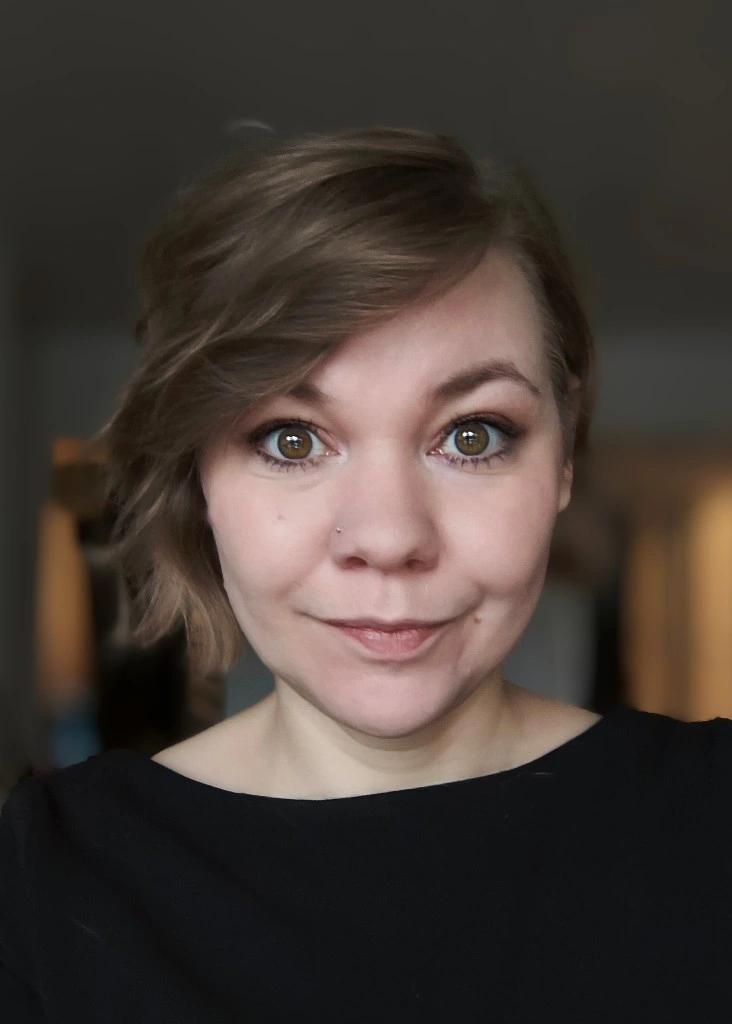Born to Finnish parents but raised with a multicultural perspective, Susanna Eskelinen has spent her life bridging cultures and working with international professionals. Her career has taken her through diverse roles in Berlin’s startup ecosystem, the Netherlands, and back to Finland, where she now focuses on inclusion, diversity, and marketing. Her personal experiences navigating bureaucracy and cultural barriers fuel her passion for these issues.
1. Can you tell us about your background and what led you to pursue a career focused on supporting international professionals and advocating for immigrant rights?
As a third culture kid with Finnish parents and an education in languages, it was inevitable I would end up in international work environments one way or another.
I started as a freelance language teacher, and worked with internationals from all walks of life – those who came to Germany to pursue a career, and others who had little to no choice but to leave their home countries.
After that, I worked my way through many roles and companies in Berlin’s international startup world, then we moved to the Netherlands for a couple of years.
But it was the return to my “passport country” where my origin story begins.
I experienced the bureaucratic hurdles of an immigrant first-hand, never having been assigned a “henkilötunnus” and going through the visa process with my Dutch partner. My German university certificates were not acknowledged, my international work experience seemed useless in Eastern Finland at first.
I kept wondering: If it’s this hard for me, how do people cope who are not as privileged as me?
Thankfully, I got to help some of them – as a Finnish teacher for Ukrainian kids and through my work in inclusion and marketing. I carry these experiences into every post I write, every conversation I have, and even into my current role.
Yet, I see that inclusion and diversity has a long way to go up North, and I want to promote those values.
2. What are some things from your home country that you miss the most, such as food, traditions, or certain places?
My own mother used to tell us growing up: “You can speak as many languages as fluently as you want to, but you will always be Finnish.” Now that I live here, I realize I have never felt more foreign. I think it is my curse and superpower at once, to spend my life between the chairs.
3. Having worked with many people from different cultures and backgrounds, what do you enjoy most about the diversity you encounter? Was there anything that surprised you when you first started working in this field?
Cultural diversity is such a blessing, but there is also so much we have in common. I love learning about the different ways people “human”. Think about the way we all share food when we celebrate, have our own music and dances, little rituals that mark our year and have been passed down from our ancestors. If you lean into the similarities, exploring the different ways that help people enjoy life is what makes us humans human.
4. If you could give one piece of advice to your younger self, particularly with your experiences in advocating for immigrants, what would it be?
Start educating yourself NOW. Listen to people who look, love and experience the world differently than you. Pay them for educating you whenever you can. Un-learn the colonialist mindset that is baked into Western societies. And once you’re angry enough: Get loud about it.
But start NOW.
5. Who has had the greatest influence on your life and career? Was there a particular person or experience that changed your perspective or shaped your path?
I will never forget Valentine’s Day 2016 – I was working with a group of Syrians and Eritreans at the time. We were learning the Latin alphabet together, without a common language. On top of leaving their home countries with little to no preparation, they now had to tackle a whole new language. But these folks showed up every day.
During the breaks they would show me music on their phones, make little jokes or open up about their grief. Our world was the little courtyard of the language school, but it held so much humanity.
For Valentine’s Day, they invited me over to their housing facility to join their celebration. Hospitality is baked into Syrian and Ertitrean culture, and I was presented with more food than I could ever eat.
I was welcomed in, shown pictures, and even got to meet the baby we talked about in class. Her name was Julia, after their first German teacher.
It gave the term “Willkommenskultur” an entirely different twist.
6. You’ve worked with many international professionals, including engineers, doctors, and marketing specialists. What are some of the most common obstacles they face when trying to enter the workforce, and how do you help them overcome these challenges?
The most common obstacles are systemic: language requirements, lack of recognition for foreign qualifications, and unconscious bias or straight up racism.
When I was working as a job coach, I realized quickly that it is hardly ever the internationals not trying hard enough keeping them from work. Of course, I did what I could while actively working on their application and interviewing skills with them. Adjustments to CV’s and cover letters due to cultural differences are not unimportant, but in Finland – as the bitter joke goes – we have the most educated cab drivers and cleaners.
Obviously, I am a loud mouth on LinkedIn, but the most important work happens behind closed doors: I speak up about ways work places and communication can be made more inclusive, keep educating myself, and learning about the different cultures.
I also just agreed with a local NGO to support them with voluntary work. They take open door policy literally and have created a space in my city where people of all ages, nationalities and identities can come to find community, support and ways to practice Finnish. It was important for me to walk the talk and actively do something about integration.
Currently I am kicking off a social media project called “Raise Your Voice” – a grass roots, organic marketing campaign to highlight the benefits of diversity.
It will start with a prompt series on LinkedIn that hopefully encourages internationals to share about their cultures, experiences and stories. In a second stage, I want to create a video series for the socials, highlighting the stories of internationals. The goal of the project is to show what untapped potential migration brings with it, and what a treasure diversity is.
7. You’re passionate about ensuring that international students and professionals have fair access to the job market. What changes do you think are necessary for immigrants to be given equal opportunities in the workforce?
It all starts with fair hiring processes. Remember when I mentioned my time in Berlin and the Netherlands? I worked in HR Tech, so I was in touch with recruiters all day, every day, consulting with them on job ads, screening questions and how to use an ATS.
Having dealt with recruitment processes and been trained in hiring people myself, I was appalled by the “hidden job market” in Finland. Not only does it promote systemic oppression, it also promotes hiring with unconscious bias. And social injustice.
We need laws for more transparency about open roles.
Anonymous hiring has been discussed, yet I am unsure if it is a viable solution, since the CV will still give away if the applicant is from outside of Finland.
Job ads need to communicate the exact level of Finnish they need. It is and always will be the best excuse to put forward the lack of language skills for not hiring an international. In Germany, the European Reference Frame is used to indicate the level needed, I have yet to see anything but “fluent Finnish” in job descriptions for roles that can be entirely executed in English.
Companies need anti-racism training. Period.
They also need support for internationalization – English lessons to be able to discuss work matters in English, cultural trainings, translation help. Ideally, subsidized by the government. One can dream, right?
Support internationals in founding their own companies, especially bureaucratically and with taxation. Many come from cultures that are far less risk-averse than Finland.
Ban unpaid internships and strengthen worker’s rights to avoid exploitation.
8. Based on your experiences, how does the way immigrants are perceived in the job market differ across different countries? What cultural or systemic factors do you think affect their success?
Based on my experience, the Dutch ‘trade mentality’ appears more open to diversity compared to some other European countries. However, it’s crucial to acknowledge that perceptions vary significantly based on factors like the individual’s country of origin, profession, and the specific industry. Systemic factors like immigration policies and cultural attitudes play a significant role.
In the tech bubble I lived during my Berlin years, it felt like diversity was at least performatively celebrated. Having said that: The job market for tech talent was far different then. I also learned about salary practices that favored graduates from particular schools with high tuition fees and a legacy preference. The glass ceilings, especially for women with non-European backgrounds, become very visible with company growth.
9. You’ve spoken about the challenges that international professionals face in securing jobs despite their qualifications. Can you share a story or moment that stands out to you from working with these individuals?
I remember working with a doctor from Sri Lanka as a job coach. His approbation would take two full years with the added hurdle to learn Finnish. He had a family to feed, and he was trying to navigate opening a bank account. He did not particularly like me, but he showed up to our appointments every time as we worked on his CV. Ultimately, I got a call that he had gotten a job – and it was entirely without my help. He had gone to a factory with his friend, and begged for two weeks of unpaid work to prove his worth.
I have too many stories like this to share all of them.
10. What do you think is the biggest misconception about immigrants and immigration today, and how do you address these misconceptions in your work?
Nobody leaves their home country to benefit from a social system to come to a small country that is dark and cold for half a year yet claims to be the “happiest”. Someone who has never lived abroad will not understand the mental, organizational and financial toll it takes to move countries. Most people uproot their lives for their and their family’s safety, others for opportunities, but nobody would do so for 700 EUR a month.
11. Your dedication to supporting international students and immigrants is clear. What continues to motivate you to fight for their rights, even in the face of challenges and setbacks?
I consider it my responsibility. I have the privilege and access through nationality, but the mindset of an outsider. I have had so many people in my life that have impressed me, taught me, and enriched my life. At times I cannot believe it even needs to be mentioned, but all humans are equal and not defined by where we so happened to be born.
12. If a young immigrant came to you looking for advice on how to build a career in a new country, what key lessons would you share with them?
It all begins with an income, and you don’t know where that will come from, so cast your net wide. Offer value with every interaction in networking and in recruitment processes, use the free visibility LinkedIn can provide. But most of all: Try to meet people in person.
If you can, start your own business.
Remember, your skills and experiences are valuable.
Susanna’s commitment to workplace inclusion and immigrant rights is deeply personal. Through her work in marketing, social media initiatives like #ProjectRaiseYourVoice, and direct engagement with diverse communities, she continues to push for systemic change. Her story is a powerful reminder that true inclusion starts with awareness, action, and amplifying the voices of those often unheard.




Leave a Reply